What counts as cheating? Sleeping with someone, or “sliding into their DM”? Find the types of cheating in a relationship to understand where to draw a line.
Exploring the examples of cheating in a relationship can help you gain a deeper understanding of what actions may be considered unacceptable in your relationship so that you and your partner can work together to prevent cheating before it happens.
What Counts As Cheating? 9 Types Of Cheating In A Relationship
1. Physical Cheating

It is one of the most obvious forms of cheating and involves the act of being sexually or physically intimate with someone outside of one’s committed relationship.
A wide range of behaviors, such as kissing, touching, having sexual intercourse, or engaging in any other kind of physical intimacy with someone who is not one’s partner is considered to be cheating.
Signs of physical cheating can include changes in behavior or routine:
- such as being unavailable or distant
- showing a lack of interest in physical intimacy
- exhibiting unexplained signs of physical injury
This can be anything from a one-night stand to a long-term affair causing significant damage to a relationship, as it violates the trust and commitment that are essential for a healthy and stable partnership.
The betrayed partner may experience a range of negative emotions, such as anger, hurt, betrayal, and a loss of trust in their partner. It can be difficult to forgive and can often lead to the end of a relationship.
2. Emotional Cheating
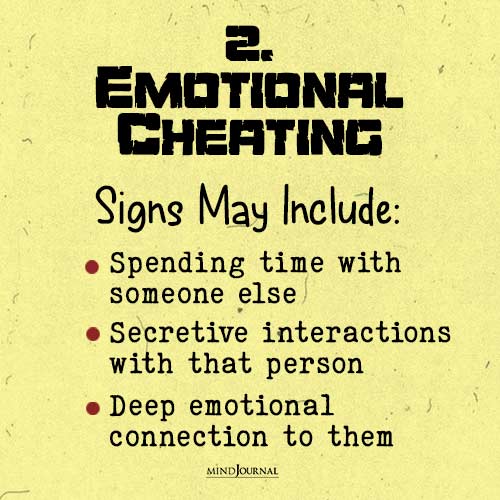
This refers to the act of being emotionally unfaithful in a committed relationship. It can involve developing a deep emotional connection or attachment to someone outside of one’s relationship.
It could be with a close friend, coworker, or ex-partner, and engaging in intimate conversations or activities with them.
Signs of emotional cheating may include:
- Spending excessive time with someone outside of the relationship
- being secretive about communication or interactions with that person
- sharing intimate details or problems with that person instead of one’s partner
- feeling a deep emotional connection or attraction to that person.
This type of cheating can be just as damaging as physical cheating and can lead to the breakdown of a relationship.
3. Micro-Cheating
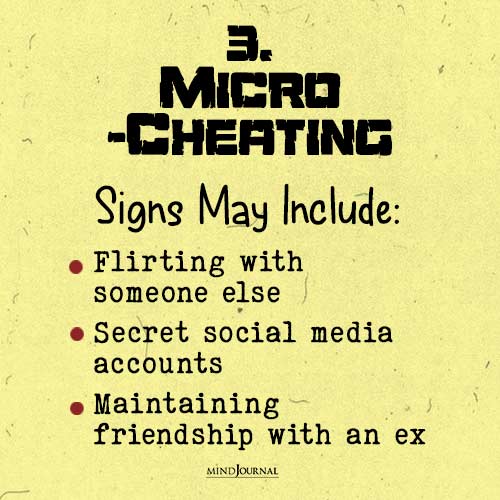
Micro-cheating refers to subtle or small behaviors that may be considered a breach of trust in a committed relationship.
These behaviors may not be overtly sexual or intimate, but can still cause feelings of betrayal, hurt, and a loss of trust in one’s partner. Examples of micro-cheating include:
- Flirting with someone outside of the relationship, even if it is just harmless banter.
- Keeping secrets or withholding information from one’s partner, such as having a secret social media account or messaging someone in secret.
- Liking or commenting on social media posts of someone outside of the relationship in a way that suggests a deeper connection.
- Maintaining a friendship with an ex-partner or someone with whom one has had a romantic history.
- Complimenting someone outside of the relationship in a way that suggests a deeper attraction
Related: 5 Causes Of Spouse Cheating: Discover The Infidelity Stages
4. Sexting or Cyber Cheating

This refers to the act of being emotionally or sexually unfaithful in a committed relationship through digital means.
This can include engaging in intimate conversations, sharing explicit images or videos, or engaging in sexual activity with someone other than one’s partner through online or digital channels.
Signs of cyber cheating may include:
- spending more time online or on social media than with one’s partner
- using secret or private messaging apps or accounts
- being overly protective of one’s phone or computer.
5. Financial Cheating
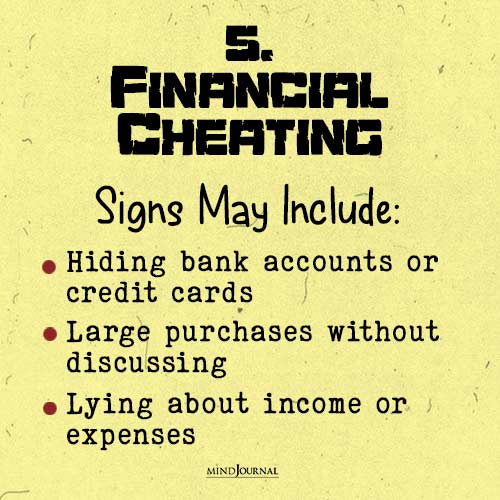
It is an act of being deceitful or dishonest about one’s financial situation or spending habits in a committed relationship.
This can involve hiding money or debt, lying about income or expenses, or making significant financial decisions without the knowledge or consent of one’s partner.
Signs of financial cheating may include:
- hiding bank accounts or credit cards from one’s partner,
- making large purchases without discussing them
- lying about income or expenses, or keeping financial secrets.
6. Time Cheating
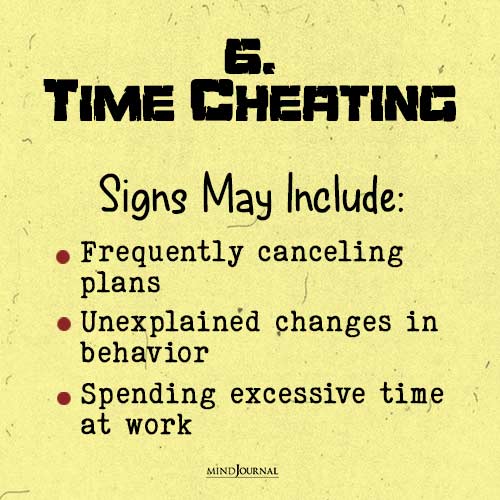
“Time cheating” is a term that can refer to different types of behavior in a relationship, but it generally involves being dishonest or deceptive about how one spends their time.
This can include lying about one’s whereabouts, not showing up when expected, or spending excessive amounts of time away from the relationship without a valid explanation.
Signs of time cheating may include:
- being defensive when asked about one’s whereabouts
- frequently canceling plans or not showing up
- exhibiting unexplained changes in behavior or routine
- spending excessive time at work
- prioritizing hobbies or other activities over your relationship.
While time cheating may not seem as serious as other forms of cheating, it can still cause problems in a relationship.
7. Commemorative fidelity

This describes a type of infidelity where a person remains in a committed relationship, but lacks feelings of love, sexual desire, or attachment toward their partner
Instead, the relationship may be sustained solely out of a sense of obligation or societal pressure, rather than a genuine emotional connection
This can lead to feelings of dissatisfaction and a desire for emotional fulfillment outside of the relationship, which may manifest as emotional or physical cheating.
Some of the signs may include:
- distant or disengaged from the partner or relationship
- suddenly working longer hours
- less interested in physical intimacy
- guilt or discomfort during intimate moments
Related: 5 Questions To Ask Yourself If You’ve Caught Your Spouse Cheating
8. Physical affair without sex
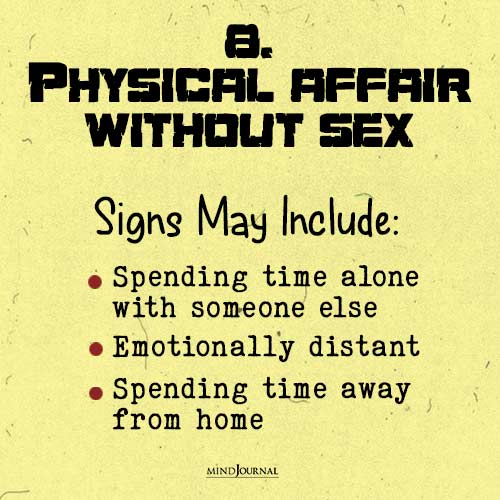
While physical intimacy is often a defining factor in a romantic or sexual relationship, it is possible to have a physical affair without sex.
Physical intimacy can include a wide range of behaviors, such as hugging, kissing, cuddling, holding hands, or even just spending time together in a physically intimate way.
If a person engages in any of these behaviors with someone outside of their committed relationship, it could be considered a physical affair.
Note that this necessarily doesn’t mean sexual contact but can still be considered as cheating and the signs that include are:
- spending a lot of time alone with someone else
- constantly texting someone else, even when they’re with their partner
- hiding or lying about their interactions with this other person
- emotionally distant and more focused on the other person
- making excuses to spend time away from home
9. Mental cheating (fantasizing about someone else)

It’s normal to occasionally and briefly have fleeting thoughts or fantasies about a person you find attractive. However, continuously allowing your mind to wander and dreaming of acts that can lead to action may be considered a form of emotional or mental cheating.
This can eventually push a person to act on those desires or can take their mind off their current relationship.
- constantly thinking or daydreaming about another person.
- comparing a current partner negatively to someone else.
- feeling dissatisfied with the current relationship.
- increased secrecy and withdrawal from the relationship
How To Deal With Cheating In A Relationship?

Dealing with cheating in a relationship can be very difficult and emotionally challenging. Here are some steps you can take:
- Take time to process your emotions
Finding out that your partner has cheated on you can be a very emotional experience. Give yourself time to process your feelings and try not to make any impulsive decisions.
- Talk to your partner
Once you have had time to process your emotions, have an open and honest conversation with your partner about what happened. Ask them to be honest with you about why they cheated and listen to what they have to say.
- Seek support
It can be helpful to talk to a trusted friend or family member about whaT has happened. If you are struggling to cope, consider seeking support from a therapist or counselor.
- Decide what you want
Once you have talked to your partner and sought support, think about what you want to do next. Do you want to try to work things out, or do you feel that the relationship has reached its end?
- Take care of yourself:
Dealing with infidelity can be emotionally exhausting, so it is important to prioritize self-care. Make sure you are taking care of your physical and mental health, and give yourself time to heal.
In conclusion, there are many different types of cheating in a relationship. Whether it’s physical, emotional, micro, cyber, financial, or time cheating, any form of cheating can be damaging to a relationship.
It’s important for couples to communicate openly and honestly with each other to prevent cheating before it happens
By recognizing the signs of cheating in a relationship and working together to build a strong, trusting relationship, couples can prevent cheating and build a lasting, healthy relationship.
Related: How To Save Your Marriage After An Affair
What is cheating in a relationship according to you? Share your thoughts in the comments below!


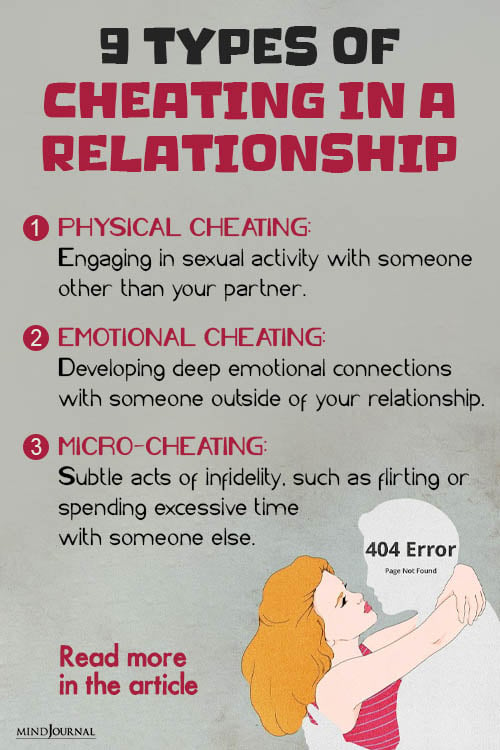

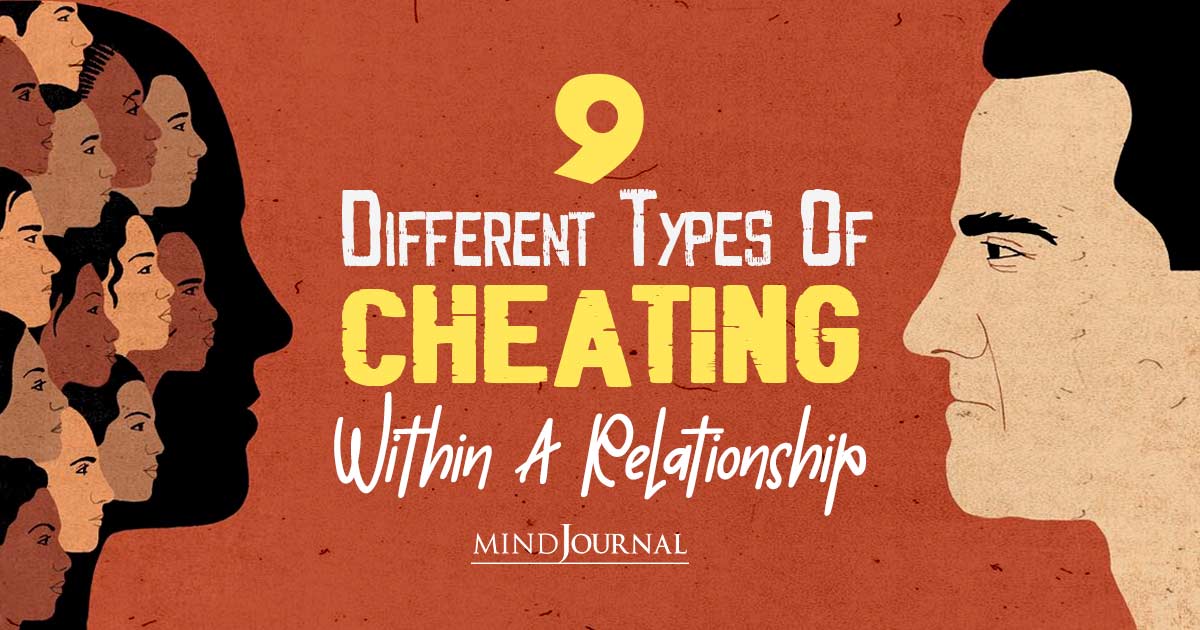




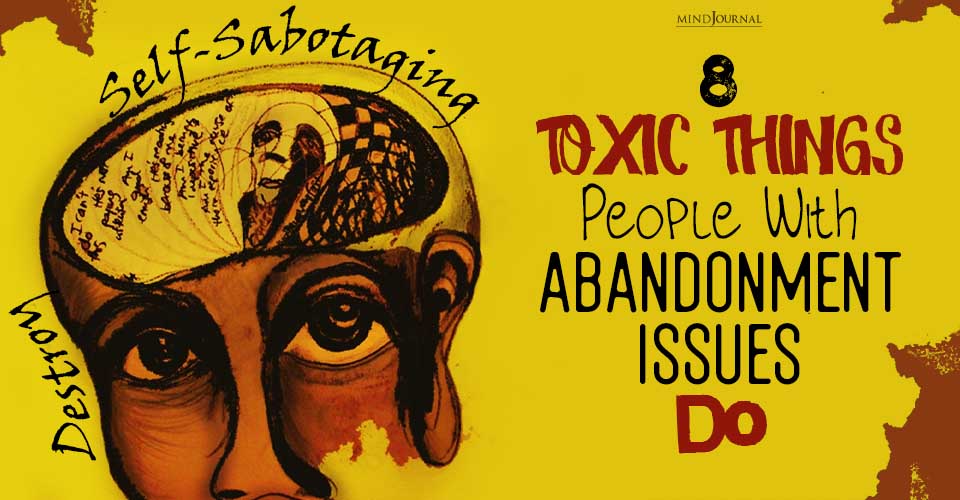


Leave a Reply